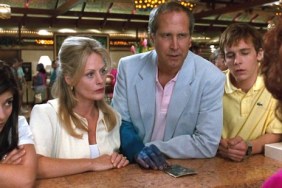They are great. I think that’s the best place to start. The Marx Bros. are great. There are no two ways about it. Watching their movies today is just as sublimely enjoyable as it was, no doubt, back in the 1930s when they first appeared. I do not use the past tense to describe their greatness, as The Marx Bros. were of that rare type comedian that managed to strike a truly timeless chord. Like early issue of MAD Magazine, the works of Monty Python, or 1940s Warner Bros. cartoon shorts, The Marx Bros. tilted into a level of surreal silliness that, amazingly, managed to transcend all known notions of topicality or politics, and reach a sublime plane of pure comedy that will likely appeal to all audiences in all times.
This week’s installation of the Free Film School here on CraveOnline will be a look and a brief analysis of The Marx Bros., arguably the funniest and best comedians to ever grace cinema screens. I will try to be brief this week, as I could easily gush for pages and pages on how great they were, and how much fun I’ve had watching their movies. It would be easy, also, to fill pages with some wonderful zingers and one-liners that the brothers – Groucho especially – have said over the years, but I will try to abstain. Will… try…
Okay, here’s a gem to get warmed up with:
“That covers a lot of ground. Say, you cover a lot of ground yourself. You better beat it, ‘cause I hear they’re gonna tear you down and build an office building where you’re standing. You can leave in a taxi. If you can’t find a taxi, you can leave in a huff. If that’s too soon, you can leave in a minute and a huff. You know you haven’t stopped talking since I got here. You must have been vaccinated with a phonograph needle.”
This was Groucho’s first speech from Duck Soup, the Bros.’ most celebrated film. Notice the banter and cadence of the speech. Every sentence leads into a gag, which, in turn, leads to a riff on that gag, which leads to a riff that leads into a pun. This is no mere string of jokey one-liners. This is verbal jazz. A way of taking known notions of language and social norms, and bending them into a new melody with an entirely new mood. All semblance of reason would vanish, and all that would be left in its place is a joyous twisted mass of hilarious detritus that once resembled logic and semantics. By using slapstick, jokes, and playful banter, The Marx Bros. turned the world into their plaything. Rich society women were instruments to be manipulated. Politics were a silly aside. Anything with the slightest play toward meaning was boyishly knocked over by the Marxes.
But I’m getting ahead of myself. Let’s give you a little background.
The Marx Bros. were born Leonard, Adolph, Julius, Milton, and Herbert in New York City between the years of 1887 and 1901. Children of French and German Jewish immigrants, they were poor kids living in a poor area of the city, and spent their youths tempering urban survival skills. Leonard, the eldest, would gamble. Adolph would flee into quiet areas and peoplewatch. Julius was definitely the ham of the family, and was the first to give himself his nickname. Milton was the business-minded fellow. Herbert was the young charmer. The five of them would come to develop a comic rapport, based mostly on Vaudeville acts and Yiddish theater traditions. Early in their lives, they decided to form their own Vaudeville act, and, thanks to their overwhelming personalities, they quickly became a hit on the stage circuit. They would often perform without scripts, developing gags as they went, and altering their act to play to their particular audience. When on the road, many of their jokes were geographically calibrated. They would perform simple comic sketches, usually starting with only the barest notion of satire, and quickly spinning into their own trademarked brand of chaotic slapstick. And while they each played many different “roles,” the performing Marxes adopted stage personae that would, in many ways, become their new identities.

Leonard became Chico, and developed a scheming Italian alter-ego for himself. Chico, very much like Leonard, was a gambling addict, and strove for wealth, but had no respect or regard for the traditional ways of doing so. He had a fierce eye, a quick smirk, a ready comeback, and was rarely seen without his red cap.

Adolph became Harpo, and became the silent childlike clown of the group. Harpo never spoke any dialogue on stage or on screen, relying on goofy props, funny faces, and outright strange behavior. He would communicate with horns and whistles. Harpo seemed like the innocent of the group. The little brother. The arrested 8-year-old in all of us. He wore a long coat full of knickknacks, a blonde mop of hair, and a bowler hat.

Julius, sort of the ringleader, became Groucho. Groucho was the brilliant wordsmith, and often played the leading man. With his greasepaint mustache, little round glasses, oversized suit and ubiquitous cigar, Groucho is a comedy icon. He was the banterer. The flip one. The one who dismissed openly all manner of manners. He is often the one credited for conceiving of the group’s comedy scenarios, although I’m sure that was much more of a group effort. Groucho, though, is most certainly the powerhouse of the troupe, and remains today one of the funniest men ever to have lived.
Milton became Gummo, who didn’t perform onstage with his brothers. Gummo was the group’s manager, and while he did help develop the material, and did write some gags with his brothers, he is often considered a lesser member of the troupe. Gummo did not appear in any of the Marx Bros.’ movies.
Herbert became Zeppo, who, kind of by default of his handsome features, became the group’s de facto straight man. Well, he still joked around with the others, but, when it came to the feature films, it was Zeppo who played the part of the dashing young lover with the story on his shoulders. Standing in contrast to the usual chaos around him, Zeppo seemed calm and reserved, although, unlike the other bland straight men around him, Zeppo seemed to have a definite understanding of his brothers’ antics. He was definitely in on the joke.

It didn’t take long for talent scouts to spot the brothers’ act and sign them to movies. Their first five talking feature films, made at Paramount between 1929 and 1933, were essentially rehashes of much of their stage material, now perfected through months of touring and refining, and now perfect for audiences. And while there was a lot of banter and some improvising going on, much of the gags were included to be tried and true. True to their reputation, The Marxes themselves were notoriously difficult to work with. Not because they were mean spirited, but because they were so fond of the live stage and improvisation. Used to the easy nature of theater, they were unused to the structure of film, and producers, looking for something they could report on, saw only chaos in the Brothers. Luckily for them, they were insanely funny, and managed to get their output on film.
Their first feature, Humor Risk (1921) is not well-known, was never released in theaters, and, indeed, has perhaps been lost to the ages. But their first talkie, The Cocoanuts (1929), sparked a renaissance in film comedy. Animal Crackers (1930), Monkey Business (1931), Horse Feathers (1932), and Duck Soup (1933) were all enormous hits in the day and are often considered to be of their Golden Era. What do the titles mean? I’m not exactly sure myself. I think they’re just meant to imply the wacky nature and bizarre nonsense of their material. I’ve heard the phrases “monkey business” and “horse feathers” before, but I’ve never heard “duck soup” mentioned outside of film discussions and certain restaurants.

I would recommend any of these, but the best of the lot is often held to be Duck Soup. The previous films all seemed to be the usual hilarious shtick transposed against different backgrounds (Monkey Business takes place on a ship, Horse Feathers takes place at a college), and, while funny, are often considered harmless. Duck Soup, directed by Leo McCarey (An Affair to Remember, The Bells of St. Mary), is the only Marx Bros. film that seems to have any sort of satirical or literary heft. Duck Soup takes place in the fictional nation of Fredonia, ruled by the recently appointed pseudo-despot Rufus T. Firefly (Groucho), who will, it is hoped, restore the country’s former wealth before the neighboring Sylvania invades. Groucho is exactly the kind of flip, casual, uncaring leader you’d expect him to be. Chico and Harpo play a pair of spies who have been sent to find a scandal in Rufus’ past. And while the story itself is a bare-bones affair (the story is a disposable element of any Marx Bros. movie), it does look to the oncoming wars in Europe with a chilling prescience. It also dares to openly mock the ins and outs of warfare with a childish gleeful dismissal.
The Marx Bros., however flip their dismissal of social norms and the very structure of language, and however much they bullied that long series of stuffy upper-class dames, never seemed mean-spirited. I have seen many comedians who comically dismiss or attack certain established social constructs, and I often sense a bitterness or meanness under it. Like they actually hate the thing they’re attacking. The Marx Bros., by contrast, seemed motivated by an enlightening sense of whimsy. None of their jibes were borne on the wings of resentment. They merely felt that no institution was too large that comedy couldn’t rattle it a little. As Groucho was once quoted as saying: “Humor is reason gone mad.” In a world made of potential jokes, and constructed of nothing but setups for punchlines, the only reasonable response is to let your reason go mad. And, of course, to have fun. You don’t have to attack the world or tear it down. But you can enjoy every small glorious absurdity.

A mention definitely should go to the unofficial fifth member of the troupe, the sparkling Margaret Dumont. Dumont, a large, well-dressed, steady-voiced woman, starred in seven of the Marx Bros., films, essentially reprising the same role in each. Dumont was the straight man of the group, often playing the stuffy matrons or wealthy socialites that Groucho would berate, Chico would swindle, and Harpo would goose. She rarely stood up to the chaotic joy of the brothers, and didn’t give the audience any winks that she knew she was in a comedy film, but did, often, seem to be in on the joke. A straight man must remain stone-faced in the face of bizarre behavior, and no one did that better than Margaret Dumont.
I should also point out that the Marx Bros. were all accomplished musicians, and each one of their films is a musical. There is no small amount of singing and dancing going on. But, like their comedy, their music was borne from a playful passion. Chico, a pianist, had nimble fingers, and has several piano solos over the course of the movies. He would banter with the music the same way he would banter with his co-stars. Chico’s gun-shaped fingers are a marvel to behold. Equally accomplished on the harp, Harpo (named after the instrument) would serenade onlookers at the drop of a hat, usually his own. And while a lot of their songs are fun to sing and have funny lyrics (watch “Hooray for Captain Spaulding” below), a few of the musical numbers and instrumental solos revealed a talent and a soul that the Marxes aren’t usually associated with. It gives them a disarming quality, that music.
After their run with Paramount, Zeppo left the group, and the three remaining Bros. signed with MGM, where they made five movies, including the well-known A Night at the Opera (1935) and A Day at the Races (1937). Many feel, though, that after these two legitimate masterpieces, the Marxes began to wane in quality. And while I would never impugn many of their gags from films like Go West (1940) or The Big Store (1941), there is a clunkiness to their later films that seem to work against their jazz-like dynamic. As if the studios wanted the films to be bigger and bigger, and have more and more complicated set pieces. This wasn’t really the Marx Bros. style. They made films together until 1949 with Love Happy, when the act sort of dissipated, and they went their separate ways.
But their legacy remains in comedy to this day. When it comes to wit and banter, no one had it more impeccably constructed than the Marx Bros. Indeed, seeing them perform today is all the more impressive, as modern comedies don’t seem to have the same interests any more. I’m having trouble thinking of the last comedy I saw that wasn’t about sexual matters, stalled romances, or broad slapstick, and actually focused on silly dialogue, a long, tight string of quick gags, and a mastery of puns. There was an obscure attempt at a Marx Bros.-like comedy in 1992 with the hilarious-but-little-seen Brain Donors, starring John Turturro, Bob Nelson and Mel Smith in the Groucho, Harpo and Chico roles respectively. At best, Brain Donors is a cult film. Some would say that that kind of comedy is old-fashioned. I say it still makes me laugh. No one could elicit a giggle like the Marx Bros., and no one had a better time looking at the world, and then twisting it into a balloon animal.
It’s their world. We just live in it.
Homework for the Week:
If you’re only going to see a few, see Duck Soup, and perhaps A Night at the Opera. Funny, right? What are your favorite comedy films? Why are they funny? Do you like physical comedy, or do you prefer word play? Does comedy need to be “edgy” to be relevant? If comedy has no “important” points to make, does it make it more or less funny? What is the true nature of satire? Can satire target broad institutions like language, or does it need to be more focused?











